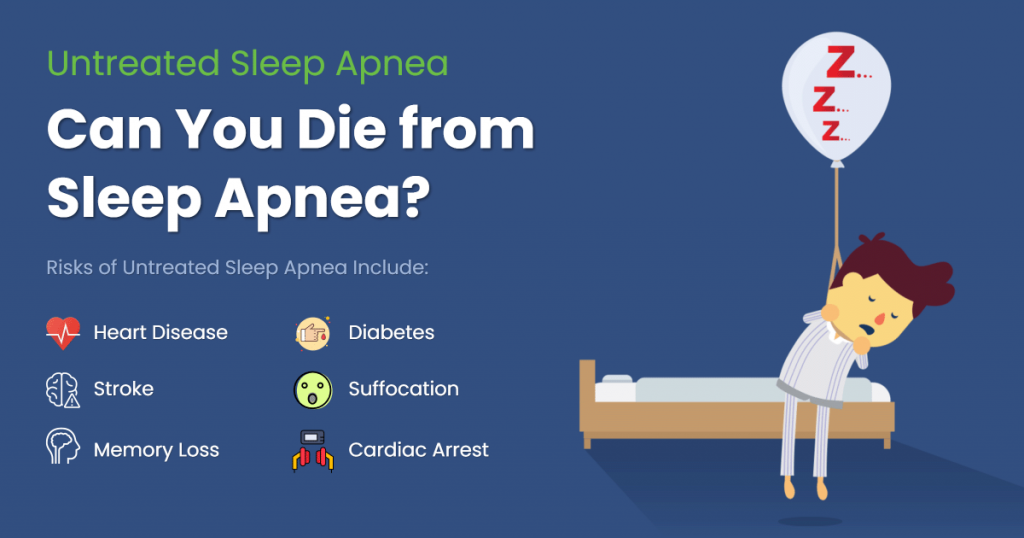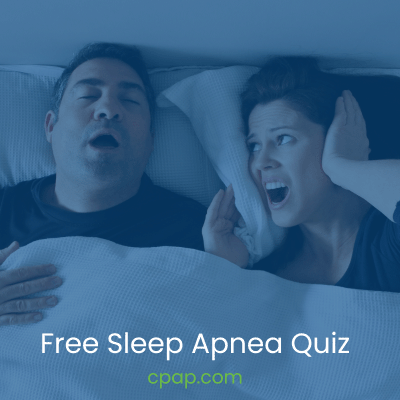
💡 Key Takeaways
- Serious Health Implications: While it’s rare for sleep apnea to be the direct cause of death, it is a severe condition that can exacerbate other health conditions, leading to death. The sleep apnea death rate is notably higher than that of the general population.
- Increased Risk with Untreated Sleep Apnea: Leaving sleep apnea untreated can significantly increase the risk of sudden death. Untreated sleep apnea can lead to heart disease, stroke, and diabetes, among other health issues.
- Prevalence and Underdiagnosis: Sleep apnea is a common condition, with over 20 million adults in the U.S. affected. Many individuals are unaware they have it, emphasizing the need for testing and understanding risk factors.
- Treatment is Crucial: While sleep apnea can have dire consequences, it is manageable. Modern treatments, especially CPAP (Continuous Positive Airway Pressure), can significantly reduce sleep apnea’s impact on overall health.
- Notable Cases: Prominent figures, such as actress Carrie Fisher and NFL superstar Reggie White, have had their deaths associated with untreated sleep apnea. Their cases highlight the importance of awareness and treatment.
This article was not written to scare you but rather to inform you of the real risks of untreated sleep apnea and offer you solutions to take the necessary steps to inform and protect you and your loved ones.
With that said, can you die from sleep apnea?
Yes, you can, and the chance of sudden death increases quickly if sleep apnea is left untreated. The risk for heart disease, stroke, and diabetes increases in those who have sleep apnea but don’t seek treatment options.
According to Dr. Amie Stringfellow, a Board-Certified Sleep Physician, “sleep apnea is a very serious condition. Although it’s rare for this condition to be the actual cause of death, it’s important to note that this condition can cause or exacerbate other health conditions that may lead to death, which is why the sleep apnea death rate is higher than that of the general population.”
You may remember the famous actress Carrie Fisher, popular for her role as Princess Leia in Star Wars. In 2016, she passed away, and according to the coroner’s report, the listed cause of death was “sleep apnea with other factors.”
Carrie isn’t the only celebrity whose death has been blamed, either partially or primarily, on untreated sleep apnea. NFL superstar Reggie White’s death has also been partially associated with untreated sleep apnea. The Reggie White Foundation was created to raise awareness and assist in the research of this common, yet underdiagnosed sleep disorder.
This sleep disorder is a common medical condition in adults, with estimates indicating more than 20 million adults in the United States have this condition. Furthermore, many people don’t realize they have it, so it’s important to get tested and know the risk factors.
In this article, we’ll take a closer look at what sleep apnea is, discuss how it affects your chance of death, and answer some common questions people have about this common sleep disorder.
What Is Sleep Apnea?
Sleep apnea is a condition that causes a person to stop breathing in their sleep. There are three types that affect people in different ways:
Obstructive Sleep Apnea
Obstructive Sleep Apnea (OSA) is a physical obstruction that blocks a person’s airways during sleep, causing them to stop breathing. This effect usually has the brain jolt partially awake to manually try and breathe in, after which the brain settles down until the next time this occurs. OSA events can occur as often as more than 30 times per hour in more severe cases.
Central Sleep Apnea
Central sleep apnea also causes somebody to stop breathing during sleep, but it occurs because the brain fails to signal the respiratory system properly. This type of sleep apnea is more rare and may result from other health issues, like a stroke or heart condition.
Complex Sleep Apnea
Complex sleep apnea is, well, complex. It’s not well understood yet, but complex sleep apnea typically occurs in people with OSA and develops from CPAP treatment. Basically, the individual has OSA, gets treatment via CPAP, but then develops central sleep apnea as a result. It does not occur in every individual who uses a CPAP, and may resolve with time.
Can You Die From Sleep Apnea?
Can sleep apnea cause death? Yes. Sleep apnea can cause potentially life-threatening health conditions, including:
- Stroke
- Diabetes
- Transient ischemic attacks (also referred to as “mini-strokes”)
- Heart failure
- Cardiac arrest
but its effects on the heart are the leading cause of people dying from the condition.
Sleep apnea is common enough that we can suspect it as a significant contributor to overall deaths from heart disease, which is the leading cause of death in the United States.
Can You Die From Sleep Apnea in Your Sleep?
Yes. You can die from not being able to breathe while sleeping, like in the case of OSA. However, it is more common to die from complications related to sleep apnea, like sudden cardiac arrests. It’s also possible to die from it while you’re awake.
Can You Die From Obstructive Sleep Apnea?
Yes. Obstructive sleep apnea is the common name for this condition and is the most frequent form of sleep apnea.
Can You Suffocate From Sleep Apnea?
Yes. Sleep apnea can cause you to choke and suffocate in your sleep, leading to death from a lack of oxygen rather than the more-common heart disease.
Think You May Have Sleep Apnea? Take Our FREE Sleep Apnea Quiz!
Is It Possible To Cure Sleep Apnea?
It’s possible to cure sleep apnea in some cases.
While no surgeries or medicines can entirely cure sleep apnea, lifestyle changes can have positive effects and reduce or eliminate the presence of sleep apnea.
For overweight people, losing weight can remove pressure on breathing areas and may completely cure sleep apnea. This approach is often the first and most effective step toward treating sleep apnea, so doctors often recommend this.
In some cases, sleep apnea may occur as a result of other medical conditions. For example, temporary inflammation of the throat can cause sleep apnea. It usually goes away on its own if you can treat an underlying cause.
In most other cases, sleep apnea is not curable, but it is treatable.
Can You Treat Sleep Apnea?
Yes. It’s possible to manage most cases of sleep apnea. If you’re concerned about questions like, “can you die from sleep apnea,” it’s important to remember that while death is both possible and likely, modern treatments, like CPAP, significantly reduce the impact of sleep apnea on your overall health.
Here are the most common treatments for sleep apnea:
Continuous Positive Airway Pressure (CPAP)
The gold standard treatment for Obstructive Sleep Apnea (OSA) by doctors is CPAP (continuous positive airway pressure). These devices push air into your body as you sleep, keeping your airways open. The result is that they prevent sleep apnea from having an effect on your body for as long as you use them, though they don’t treat the underlying causes.
CPAP machines are common and reliable options, and they’re also broadly affordable under medical plans. Doctors can often advise on ways to make the machine more comfortable for those struggling to adapt to their therapy, however, and modern CPAP machines are loaded with features designed to make the experience as comfortable as possible.
Other Airway Pressure Machines
CPAP machines are the most common choice, but there are other alternatives available depending on what your doctor prescribes.
An Auto-CPAP automatically adjusts air pressure while you’re sleeping, which can help people who have frequent changes and need more help from the device.
Bilevel Positive Airway Pressure (BiPAP) machines can provide more pressure when inhaling and less when exhaling, which can somewhat reduce strain on the body. BiPAP machines may be better for people with severe sleep apnea, but only a qualified expert can determine which device is most appropriate for you.
Oral Appliances
Oral appliances are a manual alternative to options like CPAP machines. These can help keep airways open by bringing the jaw slightly forward. These are usually better for mild sleep apnea and may not work as well in more severe cases. As always, however, individual differences can affect their performance.
Oral appliances are often available from dentists, who can custom-fit them to you and ensure they won’t have any other adverse effects. Most oral appliances need follow-ups every six to twelve months.
Oral appliances may be a better choice than CPAP machines for people who travel regularly or worry about the machine failing. They’re smaller, lighter, less obstructive, and often considerably more affordable. However, some people find them uncomfortable, which is why they’re not the most popular option.
Adaptive Servo-Ventilation (ASV)
ASV devices are relatively new. These can scan breathing patterns and put them into a database, then use that information to create a pressure cycle that helps normalize airflows.
This treatment is effective for many people, especially those with complex sleep apnea. However, it’s not as good for people with advanced heart failure or particularly severe sleep apnea, where its frequent adjustments might end up putting more strain on your body.
Are There Any Surgical Treatments for Sleep Apnea?
Yes, although these don’t truly cure. Can you die from sleep apnea without surgery, though? Most experts suggest trying a less-invasive method for several months before even considering surgery, although people with jaw problems may go immediately to this.
Tissue Removal
This procedure, with the delightfully pronounceable name of uvulopalatopharyngoplasty (UPPP for short), aims to help treat sleep apnea by removing extra tissue in the throat. It’s more effective in mild and moderate cases but may not be as appropriate for severe cases.
UPPP works, but it’s also a relatively painful procedure. The surgical area is sensitive, and most people will have noticeable pain afterward. Expect to take pain medications and antibiotics during recovery.
Despite the discomfort of this procedure, it’s the most common surgical option for people looking for sleep apnea treatments. It’s also relatively safe, despite the pain. Death as a result of surgical complications here is extraordinarily unlikely. Depending on individual factors, its success rate varies from 25% to 80%.
Some people also use weight loss surgeries to help with sleep apnea, which technically falls under the category of tissue removal. However, removing fat from other areas of the body may not reduce the amount around the throat and airways, which is the primary concern here.
Tissue Shrinkage
Tissue shrinkage is an innovative technique that uses radio waves to remove some tissue in the body. The results are similar to tissue removal, but since it’s considerably less invasive and has fewer risks, some people prefer this as a treatment option.
Implants
Implants are a relatively rare treatment option because researchers are still testing their effectiveness. These usually aim to keep the airway open at all times, preventing incidents of sleep apnea.
One example is the Inspire UAS device. It’s currently the only FDA-approved alternative to a CPAP. It stimulates the hypoglossal nerve, the one that controls the tongue’s motor functions to gently lift it and open the airway during inhalation.
Jaw Repositioning
Also known as maxillomandibular advancement, jaw repositioning permanently moves your lower jaw forward. This alteration naturally enlarges the airway behind it, helping it stay open and reducing the chance of sleep apnea. It has consistent benefits but doesn’t completely stop sleep apnea in all cases.
What Happens If You Don’t Treat Sleep Apnea?
The long-term consequences of not treating sleep apnea are extensive. Other severe health conditions have been tied to sleep apnea, including heart disease, stroke, type II diabetes, and Alzheimer’s.
Aside from developing long-term health conditions, many people who suffer from untreated sleep apnea notice a negative impact on their daily life. They may have dry mouth, mood swings, and difficulty staying awake during the day. It can lead to more accidents, especially while driving, and decreased efficiency at work or school.
Frequently Asked Questions
Here are some common questions people have about sleep apnea.
How Likely Is It To Die From Sleep Apnea?
The chance of death from sleep apnea varies depending on its severity, with worse cases having a higher mortality rate. Studies have found that sleep apnea that’s left untreated has a mortality rate of as much as 4.3 times the average, although this drops significantly with proper treatment.
Counting less-severe forms of sleep apnea, the death rate is roughly double the population average.
Can You Die Suddenly From Sleep Apnea?
Can you die from sleep apnea with no warning? Yes. Sleep apnea can lead to sudden death in several ways, though sudden cardiac death is the most common form of rapid perishing from this condition. Sleep apnea has many effects on the body, particularly on the heart, and it can cause or worsen an array of heart conditions.
How Long Can You Live With Sleep Apnea?
Sleep apnea can reduce overall life expectancy by an average of 8.7 years. This study’s researchers highlight an inextricable link between life expectancy with sleep apnea and cardiovascular health, respiratory health, brain age, and epigenetics.
What Happens If Sleep Apnea Is Left Untreated?
Sleep apnea can cause a wide variety of health problems if left untreated. Common conditions include high blood pressure, strokes, the onset of Type 2 diabetes, heart failure, and heart attacks. It can also cause vehicular accidents, poor performance in jobs or at school, fatigue, and various other effects.
What Happens If You Ignore Sleep Apnea?
Sleep apnea usually worsens over time, with most people seeing significant worsening over about seventeen months. Other health conditions caused by sleep apnea tend to get worse at the same time, so the effects get worse much faster with time.
How Serious Is Severe Sleep Apnea?
Severe sleep apnea is a serious threat to an individual’s long-term survival. Fortunately, you can manage this condition. If you’re not sure whether you have sleep apnea or not, an at-home test can provide quick answers.
Celebrities Who Died From Sleep Apnea
Several celebrities have died from sleep apnea. Among these, one of the most famous is Carrie Fisher, best known for her role as Princess Leia in the iconic Star Wars movies.
Jerry Garcia (member of the Grateful Dead band) and Justin Tennison (who appeared on The Deadliest Catch) also died from sleep apnea as a significant contributing factor.
Among other figures, the Hawaiian musician Israel Kamakawiwo’ole (who sang Somewhere Over The Rainbow) had sleep apnea. President Howard Taft was known to suffer from sleep apnea in the early 1900s when few treatment options were available.
Is Sleep Apnea Dangerous in Adults?
Yes. Sleep apnea is dangerous in adults of all ages, although older adults are more likely to develop this condition. Sleep apnea can cause many problems throughout an individual’s life.
Final Thoughts
So, can you die from sleep apnea? The answer is clearly yes. Sleep apnea directly contributes to many potential causes of death, ranging from suffocation to sudden heart failure. It tends to worsen if left untreated, and many people don’t even realize they have it.
Fortunately, there is hope. Some people can completely cure sleep apnea by losing weight, while others can mitigate its effects by using CPAP machines or one of the alternative therapies described above.
It’s always better to be proactive about solving issues like this. If you’re unsure whether you have sleep apnea, get a test as soon as possible. Early intervention can help stop sleep apnea from progressing and may even let you cure it before you develop other health conditions.





